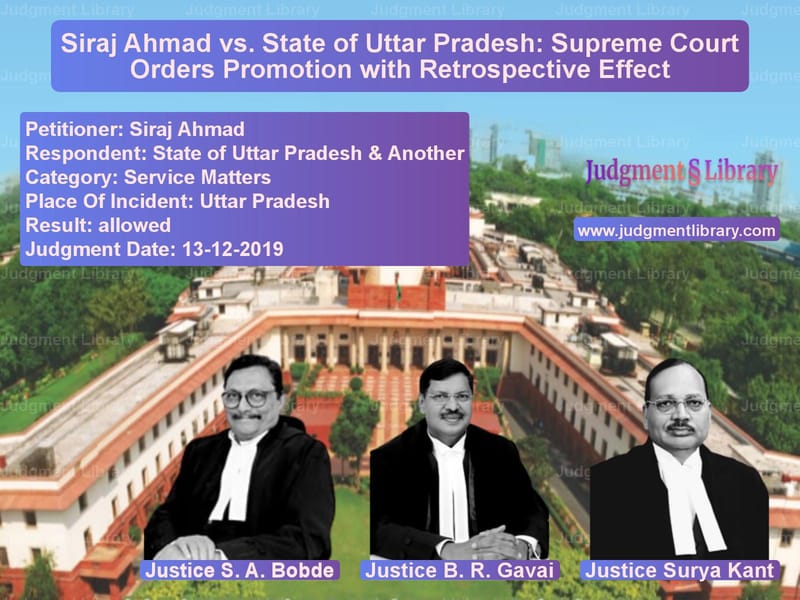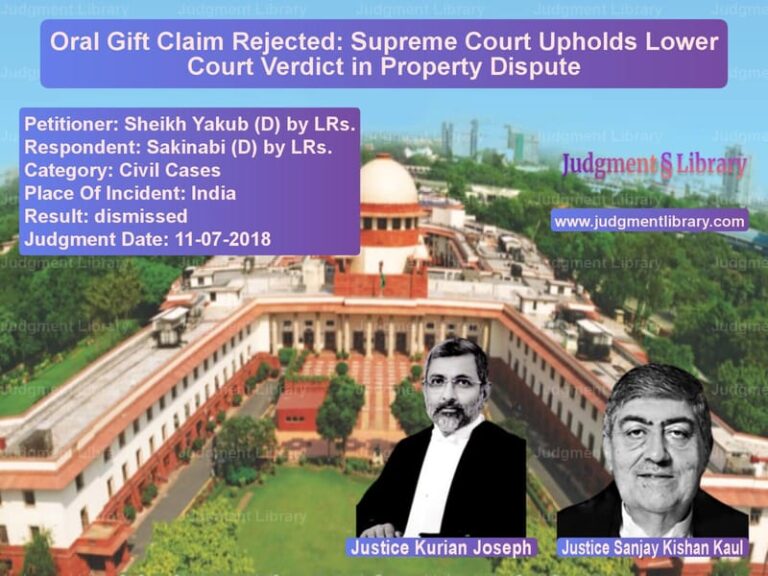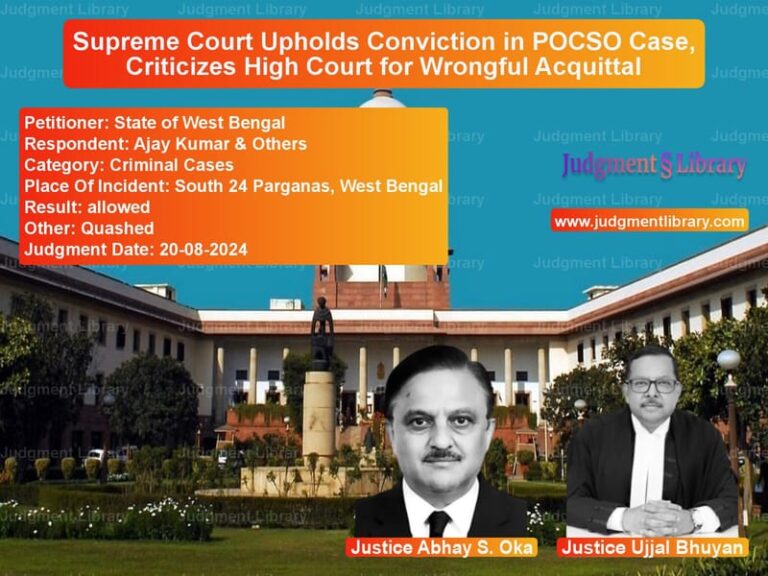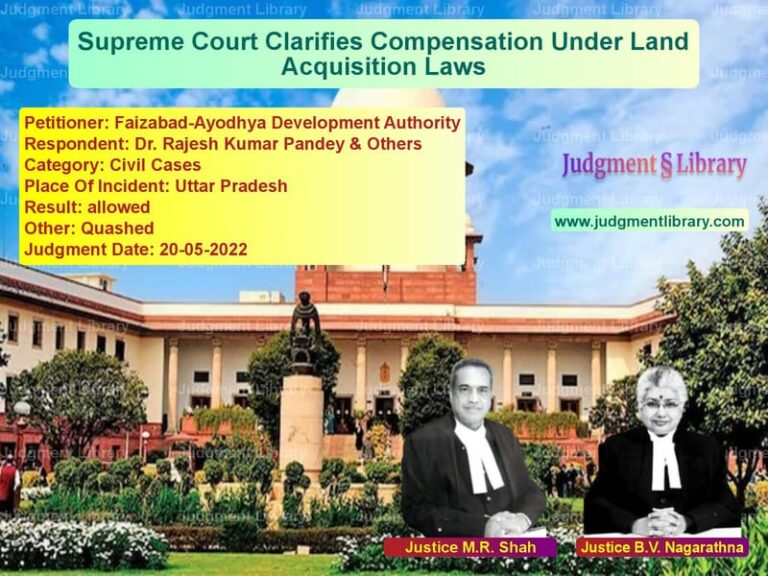Siraj Ahmad vs. State of Uttar Pradesh: Supreme Court Orders Promotion with Retrospective Effect
The case of Siraj Ahmad vs. State of Uttar Pradesh & Another revolves around a dispute concerning the promotion of a Junior Engineer to the post of Assistant Engineer. The Supreme Court had to determine whether the appellant was entitled to promotion with retrospective effect, considering that his juniors had been promoted earlier while he was overlooked.
Background of the Case
Siraj Ahmad, the appellant, was appointed on an ad-hoc basis as a Junior Engineer on 30.03.1987 in the pay scale of Rs. 485-860. His appointment was approved by the Governor of Uttar Pradesh and was made following a proper selection process under the U.P. Development Authorities Centralized Services Rules, 1985.
He later obtained a Bachelor of Science in Engineering from Aligarh Muslim University on 08.06.1987 and informed the authorities about his qualification, seeking promotion to the post of Assistant Engineer (Civil) under Rule 24(3) of the said Rules.
The government sought information about eligible candidates, and the Agra Development Authority confirmed that Siraj Ahmad was the only eligible Junior Engineer in their department. Despite this, he was not considered for promotion, whereas his juniors were promoted on 18.01.1995. His request for promotion was rejected on 16.04.2015.
Aggrieved by this, he filed a writ petition before the Allahabad High Court, which was dismissed on 11.09.2017. He then appealed to the Supreme Court.
Legal Issues Before the Supreme Court
- Whether Siraj Ahmad’s services should be counted from the date of his initial appointment for promotion purposes.
- Whether he was wrongfully denied promotion when his juniors were promoted earlier.
- Whether his appointment could be considered irregular or illegal due to a lack of concurrence from the U.P. Public Service Commission.
Arguments by the Appellant (Siraj Ahmad)
- His appointment was made following a proper selection process and approved by the Governor.
- His service should be counted from the date of his initial appointment for determining seniority.
- The Allahabad High Court had previously ruled in favor of similarly placed candidates, directing their promotion after 10 years of service.
- His juniors were promoted in 1995, while he was overlooked without justification.
Arguments by the Respondent (State of Uttar Pradesh)
- Siraj Ahmad’s appointment was made without the concurrence of the U.P. Public Service Commission, making it irregular.
- The High Court was justified in dismissing his petition as he had no legal right to promotion.
- The promotions granted to other employees could not be cited as a precedent since each case must be decided on its own merits.
Supreme Court’s Judgment
The Supreme Court ruled in favor of Siraj Ahmad, holding that he was entitled to promotion with retrospective effect.
The Court referred to its earlier judgment in Direct Recruit Class-II Engineering Officers Association vs. State of Maharashtra, where it held:
“Once an incumbent is appointed to a post according to the rules, his seniority must be counted from the date of his appointment, not from the date of confirmation.”
Further, in State of M.P. vs. Lalit Kumar Verma, the Court distinguished between illegal and irregular appointments. It held that an appointment is illegal if it disregards constitutional principles, whereas it is irregular if some procedural aspects are not strictly followed. Since Siraj Ahmad was appointed after a proper selection process, his appointment was deemed irregular, not illegal.
The Court also referred to State of Karnataka vs. M.L. Kesari, which allowed regularization of services after 10 years of uninterrupted work. Applying this principle, the Court ruled:
“Since the appellant has continuously worked in the department and his appointment was not illegal, his service must be counted from the date of initial appointment for promotion purposes.”
The Court found it unjustifiable that the High Court had previously granted relief to similarly placed candidates like Rajendra Prasad Dwivedi but denied the same to Siraj Ahmad.
Final Decision
- The Supreme Court allowed the appeal and set aside the High Court’s decision.
- Siraj Ahmad was entitled to promotion from 18.01.1995, the date on which his juniors were promoted.
- The government was directed to grant him all consequential benefits, including back pay.
Key Takeaways from the Judgment
- Appointments made through a proper selection process, even if missing some procedural formalities, cannot be deemed illegal.
- Service must be counted from the date of initial appointment for promotion purposes.
- Employees cannot be denied promotion when their juniors have already been promoted.
- Government authorities must ensure fairness in promotions, and similarly placed candidates must be treated equally.
This ruling upholds the principle that an individual’s rights cannot be denied due to procedural irregularities if their selection was otherwise lawful. The judgment reinforces the importance of fairness in service matters and prevents arbitrary denials of promotion.
Petitioner Name: Siraj Ahmad.Respondent Name: State of Uttar Pradesh & Another.Judgment By: Justice S. A. Bobde, Justice B. R. Gavai, Justice Surya Kant.Place Of Incident: Uttar Pradesh.Judgment Date: 13-12-2019.
Don’t miss out on the full details! Download the complete judgment in PDF format below and gain valuable insights instantly!
Download Judgment: Siraj Ahmad vs State of Uttar Prade Supreme Court of India Judgment Dated 13-12-2019.pdf
Direct Downlaod Judgment: Direct downlaod this Judgment
See all petitions in Promotion Cases
See all petitions in Recruitment Policies
See all petitions in Public Sector Employees
See all petitions in Employment Disputes
See all petitions in Disciplinary Proceedings
See all petitions in Judgment by S. A. Bobde
See all petitions in Judgment by B R Gavai
See all petitions in Judgment by Surya Kant
See all petitions in allowed
See all petitions in supreme court of India judgments December 2019
See all petitions in 2019 judgments
See all posts in Service Matters Category
See all allowed petitions in Service Matters Category
See all Dismissed petitions in Service Matters Category
See all partially allowed petitions in Service Matters Category







